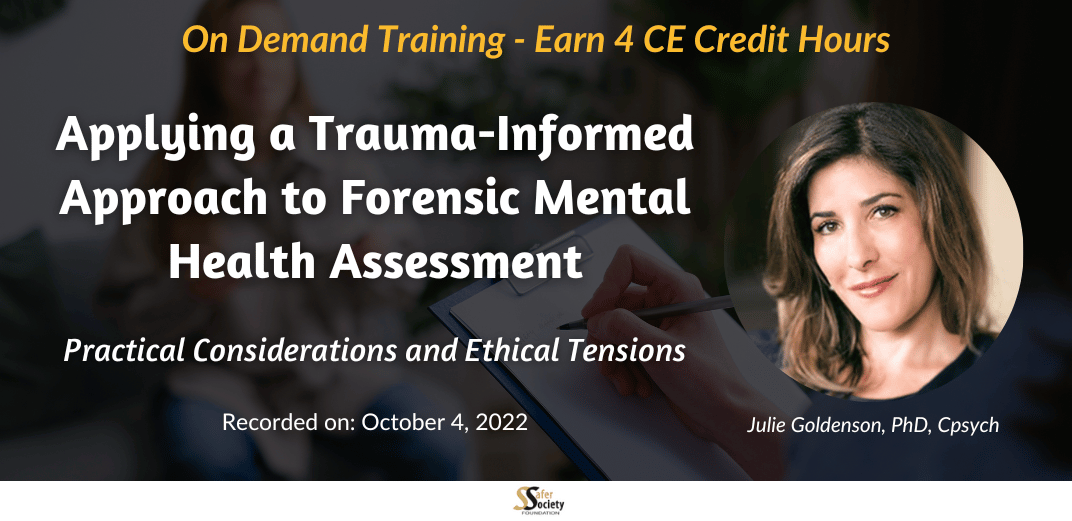
Applying a Trauma-Informed Approach to Forensic Mental Health Assessment: Practical Considerations and Ethical Tensions
Already purchased an On Demand training?
Click here to access your Safer Society On-Demand Training Center account.
Trauma-informed approaches with justice-involved individuals have gained currency in recent years. However, there has been little focus on applying trauma-informed practices to conducting forensic mental health assessments. Despite growing empirical support for forensic evaluators to receive adequate trauma training, this area constitutes a major knowledge gap for many practitioners. In this program, Dr. Goldenson will highlight the relevance of integrating the assessment of adverse childhood experiences and complex traumas into the mental health assessments of criminal justice-involved individuals. She will also discuss how to manage the ethical tensions inherent in the forensic role that can become amplified when evaluating trauma-affected examinees. Such tensions include:
- Maintaining role clarity while developing sufficient rapport with the examinee
- Mining data to inform opinions while ensuring the examinee is not subjected to undue distress or danger
- Relying on expertise and knowledge about psychological testing and diagnosis while remaining open to new data
- Attending to cultural differences.
Dr. Goldenson will use case examples to bring this material to life.
1) Considering and mitigating power imbalances inherent in the forensic assessment process.
2) Taking nuanced approaches to the use of empathy in the forensic assessment context.
3) Observing and managing altered states of arousal and distress in examinees.
4) Gathering meaningful data on an examinee’s exposure in childhood to trauma and adversity.
5) Selecting and interpreting appropriate psychological tests with an understanding of their limitations.
6) Understanding diagnostic formulations beyond those of the DSM-5
7) Making meaningful treatment recommendations.
8) Considerations in providing feedback to examinees.
Audience
This training is for professionals working with people who have problematic behaviors. Professionals who will benefit from this training include social workers, psychologists, clinical counselors, and interested paraprofessionals.
Content Level
Disclosure
Continuing Education Approval
American Psychological Association (APA)
Safer Society Foundation, Inc. is approved by the American Psychological Association (APA) to sponsor continuing education for psychologists. Safer Society Foundation, Inc. maintains responsibility for this program and its content.
Who's Presenting

Julie Goldenson, Ph.D., C.psych.
Dr. Goldenson is a clinical and forensic psychologist, the president of the Ontario Psychological Association, and a professor at the University of Toronto. She is also a member of the Program in Psychiatry and the Law in association with Massachusetts Mental Health Center/Harvard Medical School and is the 2021 recipient of the Strasburger Award in recognition of her contributions to this program. Dr. Goldenson completed a post-doctoral fellowship in forensic psychology in association with the Mental Health, Law and Policy Institute at Simon Fraser University and has interned and worked in a variety of psycho-legal contexts. She currently conducts forensic mental health assessments in her private practice and is retained in both criminal and civil matters. Dr. Goldenson also remains actively engaged in research and has a number of first-author publications related to forensic psychological assessment, the psychological impact of trauma, domestic violence, female offenders, and Adverse Childhood Experiences (ACEs) and resilience among at-risk youth.
